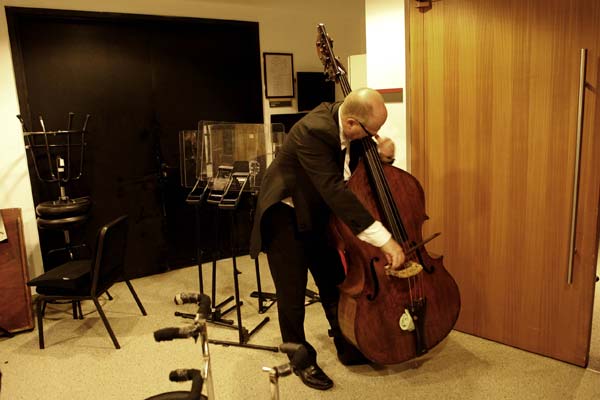Sydney Symphony Orchestra's Alex Henery is set to perform Tan Dun's 'The Wolf', the final part of the Stravinsky trilogy 'Petrushka - Immortal'.
Alex's instrument is the double bass, which is a somewhat uncommon soloist that will be highlighted during this piece. 'The Wolf' has been composed with both Western and Eastern influences which in turn makes for a beautifully dynamic piece that Alex will bring to life with his double bass. Alex is extremely talented when it comes to playing the double bass, and looks to display how the instrument is a true hidden gem amongst the orchestra world. He gives us an inside understanding of the show, and how the double bass has come to be the soloist for this piece.
 Image © Keith Saunders
Image © Keith SaundersThe double bass is said to be an uncommon solo instrument. Why do you think that is?
There are probably several reasons for this. Firstly, historically, the bass was assigned the role at the bottom of the orchestra, so invariably fell below the radar of many composers as a solo instrument. There were several exceptions to this, such as Haydn who featured the bass in quite a few symphonies, and wrote a now lost concerto for the instrument. Also acoustically the bass provides specific challenges to composers with regard to projection. It always fascinates me that I can sit in a huge an auditorium and play a tiny pianissimo pizzicato and you can clearly hear it at the back of the concert hall, but if I play in a similar register to viola or low violin at maximum volume with just a small number of other musicals the clarity can be lost. Obviously this presents specific orchestration issues for composers, and performance issues for players.
Slowly but surely, composers like Tan Dun seem to be exploring the use of the double bass as a solo instrument. Why do you think this change of direction has come about?
I am not sure which happens first, either the composer hears something done differently on the instrument and sets about to exploit the new sound in a new work or the player is presented with a new composition which requires a new approach to the instrument which subsequently results in a feedback loop for other players and composers. One thing is certain is that currently bass players and composers for the instrument are re-writing the manual every few years on what is feasible on the instrument. There has been an exponential growth in recordings, YouTube clips etc and the overall playing standards around the world have been rising rapidly in the last 25 years.
Do you feel works like the 'The Wolf' assist with both composers and audiences coming to love the "undiscovered gem" that is the double bass?
Yes, most definitely, primarily because it is both ground breaking in compositional style for the instrument, and accessible to a majority of audiences and hopefully other composers. In my opinion there have been works in the past that have almost redefined what the instrument is capable of, but have then largely been ignored. An example would be Shostakovich 14th symphony – his chamber symphony, the first movement of which is largely a duo for two solo bassists and two male singers. It is an extraordinary work, and does to my ear redefine the potential expressive nature of the double bass, it has however been largely ignored, and is not terribly common on the concert platform.
What qualities of the double bass are you looking forward to showcasing during your performance of 'The Wolf'?
As with many great instrumental concerti there has to be a balance between expressive lyrical playing and virtuoso passage work. The Tan Dun is no exception to this, and is brilliantly balanced between the two styles. In particular the opening five to six minutes of the work is an incredibly atmospheric lyrical piece, using pentatonic melody and Chinese string playing techniques. The double bass being so large and hence are notes being so far apart, we can really maximise these effects of distance in the melody.
The piece of music you'll be playing is relatively new. Does that make the prospect of playing it more daunting or exciting? Why?
Yes definitely daunting and exciting, for two reasons. Firstly - most players would not present a concerto they had not already performed in a situation such as this. If you are going to stand up in front of a major orchestra and perform anything you would want to have performed it previously at least with a piano reduction, in order to have discovered the numerous potential performance pitfalls that never show themselves in the practice room. Secondly, when presenting a piece you already know, the process is essentially re-acquainting yourself with the notes/styles and music. If it has been some years since you have looked at a work you may have numerous adjustments artistically, but essentially already know what you are trying to achieve with the work.
What was the most challenging part of getting inside the piece and communicating Tan Dun's concerto using your double bass?
Definitely the newness, simply having to learn the entire work, bass part and score from scratch, and having to present it for its first time on the Sydney Opera House Stage.
The Sydney Symphony Orchestra performs 'Petrushka - Immortal' at the Sydney Opera House from 17-19 August.

